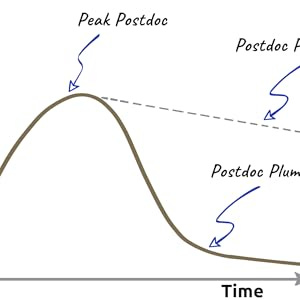Using a Guidebook: Leaving Academia
Summary of an influential book related to transitions that has guided me
Leaving Academia by Emma Williams is a short guide geared towards academic postdocs who are looking to exit the ivory tower. The lessons and advice though go beyond postdocs and apply to anyone who is entrenched in a field or career and looking to make a pivot.
The Scratchy Blanket
It’s very easy to get wrapped up in a comfort blanket of a job or career path. The desire to be comfortable and feel in control can cause you to normalize a bad situation. Academia, but other institutions as well such as medicine or law, can cast a long shadow and take over your life. If you’ve been in the same field for a while, the thought of leaving and venturing into the unknown is scary. You may also fall into the sunk cost trap, develop a fixed mindset around being unable to do anything else or feel this career is a calling you can’t ignore. All of this can lead you to stay under the comfort blanket.
One method to evaluate your readiness to make a pivot is to map your past experiences and ask “am I at my peak, am I plummeting or am I plateauing?”. Ideally you would reach your peak, know you had reached it, and then find another peak before either plummeting or plateauing. That is rarely what happens though as it’s hard to not cling to what you’ve always known and hard to jump into the unknown. Plateauing, or even plummeting, can become your new normal.
Dr. Williams suggests exploring the concept of Ikigai to help determine where you’re at and where you may want to go.
What you love
What you’re great at
What the world needs
What will the world pay for
Creating a Net
As you accept the need for change and start to identify new areas to explore, you can weave a net to help you climb to a new peak and support any falls along the way. This net is made of gold, steel and purple thread.
Gold thread: Values
Values are what you prioritize in life and work and are evident in your behaviours and attitudes. One way to identify what you value is to think of a great day (work or personal) when you were proud and things were flowing.
What were you doing?
Why did you feel great?
Who were you with?
What other factors played a role?
Do this for a number of high points and start to notice commonalities. You can use a values list to help articulate what was core to those experiences.
Steel thread: Strengths
What makes you feel energized and passionate? You likely have many skills from your career, but it’s time to reflect on which skills you really like doing and get you fired up. Remember, what you have the most technical expertise in (ie what you trained in your PhD in) may not be the task that gives you energy and you could do endlessly. This isn’t about what makes a good researcher, nurse or programmer, it’s about what you love to do and want to do more of.
If you’re unsure about your strengths, ask colleagues and friends what you’re good at. Having an outside opinion may help reveal your strengths.
Purple thread: Courage
This last thread is needed to pull the other two together and make the pivot. It takes courage to choose what you want over what you feel obligated to. If you work at a single company for 10 years, you may feel a sense of duty to your manager or the CEO or the organization. It can be hard to get over the guilt of leaving when you know the situation is no longer working for you.
Start small and find 1 completely new job that interests you (gold thread) and that utilizes your strengths (steel thread). Read the description and for each requirement, write down any of your experiences that could be applicable, regardless of exact title match or context.
Don’t Go Alone
It takes resilience to make a career transition; evaluate your values and skills and decide to make a jump. It takes courage to ask others for help during this transition too, but you need others' support and knowledge to help you navigate this change.
The best way to learn about where you’re transitioning to (be it a new field, career path or company) is to talk with people in those roles or organizations. Informational interviews give you new perspectives and knowledge which can help guide you in your decisions.
Cultivating your network is also important. You want a broad range of people who you can tap when you need specific support. It’s recommended you find people to fill these 4 roles in your network as you pursue new career goals:
Navigators: experts in the field who can help you navigate politics and provide context
Challengers: mentors and coaches who will ensure your plan is sound
Unlockers: provide resources and get you into the right room
Influencers: talk to the right people on your behalf and give you that chance
Networking is more than adding people on LinkedIn. It’s an intentional curation of people who can help you. It is also a platform for you to help others, and let others know what you’re about. “Selling yourself” isn’t very appealing, but people need to know what you do and where you want to go. Your network can consist of professional contacts or people you play sports with. Having similar interests and skills draws people together, you can use this to share your career goals and strengthen connections. Networking is two sided and to get people to trust and recommend you, you need to offer value and help as well.
Curating a support ecosystem guides your career transition and future career paths, but it also benefits your connections who are also trying to make their own career journeys.
Networking is also the opportunity to reform your identity. If you’re making a career change, such as moving from academia to industry, you need to change those external indicators that signal your past identity. If you look like a postdoc on LinkedIn, it will be hard to connect with professionals and convince them you’re consultant or business analyst material.
“What got you here won’t get you there”
You can take the skills and knowledge from your past work life, but you’ll need to craft a new persona to embody this new career path.
Don’t Find a New Comfort Blanket
Transitioning careers can be emotional and unmooring, especially if you’re forming a new identity and immersing yourself in a new field. Recognize that it’s ok to feel unsettled for a while after a transition. Get in the habit of reflecting and checking in with yourself continuously. Recognize feelings and pay attention to repeating patterns.
As a new role becomes more comfortable, it can be tempting to cling to this new comfort blanket. Try to avoid plateauing or plummeting, but rather notice ahead of time when you’re cresting your peak and find new peaks to climb to. It’s good to stay curious about what role and direction is next for you, even as you’re in the middle of your current job. The intention isn’t to be job hopping, but rather to not get defined by a specific role and feel stuck. Jobs should transform you and help you reach that next peak.
As you navigate your career path and transitions, don’t forget about the people you meet along the way. Staying connected to past colleagues will strengthen your network and you never know where connections will lead you. Similarly, you never know when you’ll be able to help past colleagues or mentor new contacts, further developing your support network.





